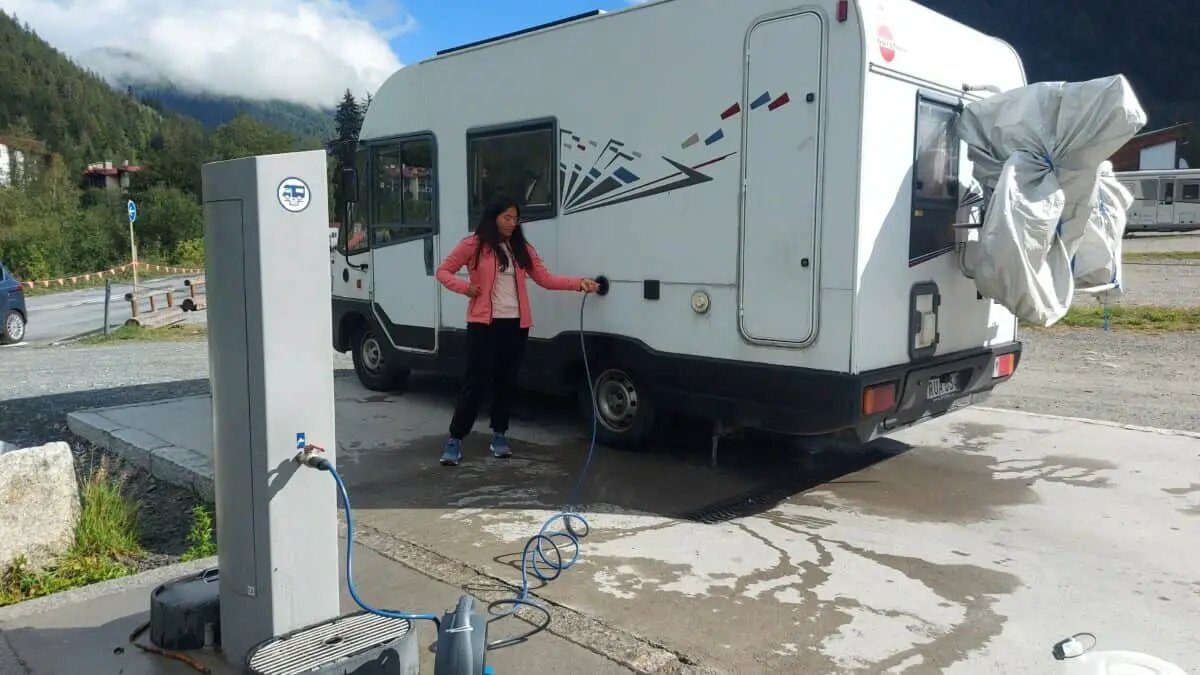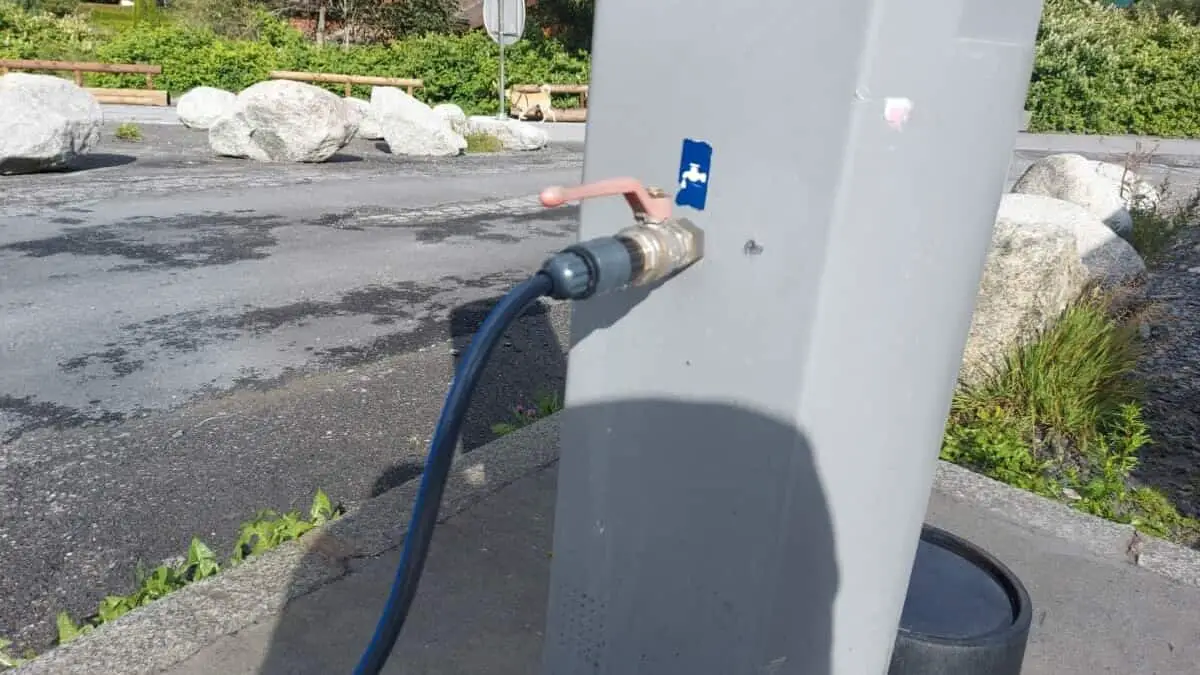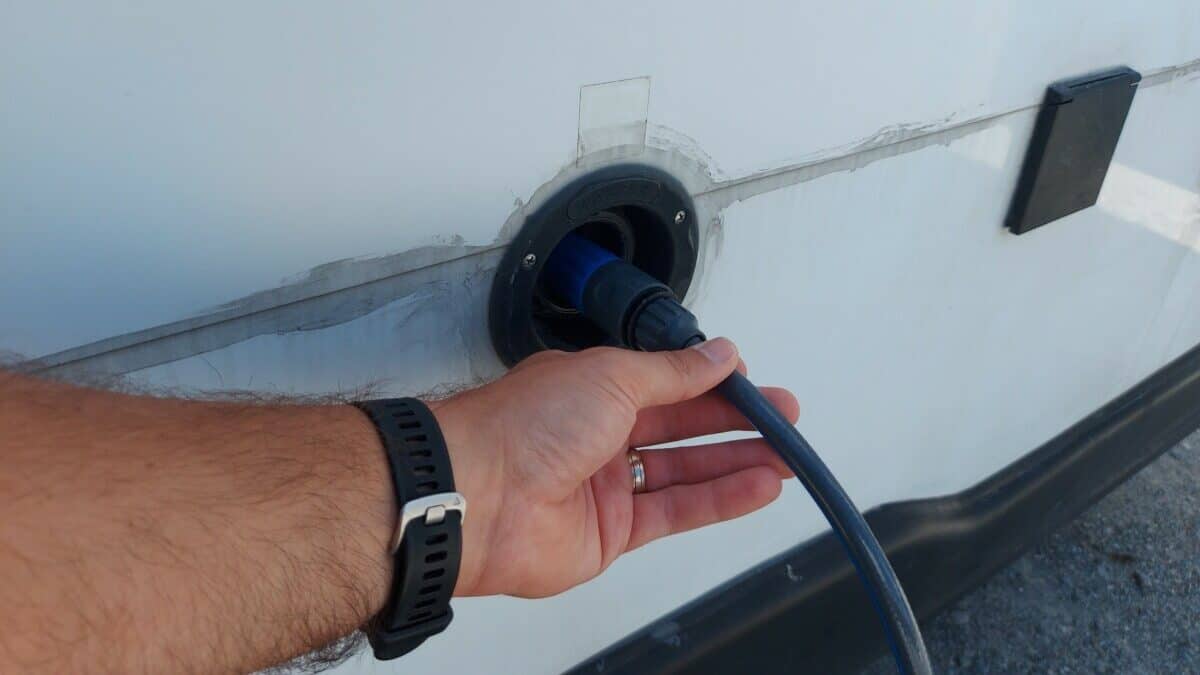This post contains affiliate links (I get a commission at no extra cost to you for purchases made through links in this post).
Are you, like many others, wondering if it is expected that it takes so long to refill your motorhome, RV, or caravan fresh water tank? Maybe you are just curious to know how long it takes. In this article, I will show you exactly how long it takes to refill water tanks of different sizes.
A 30-gallon (113 L) water tank would take 12 minutes to fill with a water flow of 2.5 GPM or 9.5 LPM. How long it takes to refill a motorhome, RV, or caravan fresh water tank depends on its size, the tank’s air ventilation, and the water hose flow rate after eventual water filters or pressure regulators.
There are a lot of variables when it comes to how long time it takes to fill up a water tank; even the length and diameter of the hose have a significant effect, as well as if the water tank is well-ventilated so that the air inside the tank can get out at the same rate as water is coming into the tank.
Even the famous Camco RV water filter will limit your flow rate to MAXIMUM 2.5 GPM (9.5 LPM)! Later in the article I explain how you can learn what water flow rate you have and what may limit it.
How Long Does It Take To Fill a 20, 25, 30, 40-Gallon Water Tank?

I have made a table below showing how long it takes to refill 20 – 40 gallons or 75 to 151 Liters motorhome, RV, or caravan water tanks using different water flow rates, between 1.5 GPM (5.6 LPM) and 5 GPM (18.9 LPM).
Underneath this table, I have another one for even larger water tanks. If you have a bigger one, I suggest you scroll down to the following table, where I show how long it takes to refill 50 – 100 gallon or 190 – 378 Liter water tanks.
| Flowrate In Gallons per minute & Liters per minute | Time to fill 20 Gallons 75 Liters | Time to fill 25 Gallons 95 Liters | Time to fill 30 Gallons 113 Liters | Time to fill 40 gallons 151 Liters |
|---|---|---|---|---|
| 1.5 GPM 5.6 LPM | 13.3 Min | 16.6 Min | 20 Min | 26.6 Min |
| 2 GPM 7.5 LPM | 10 Min | 12.5 Min | 15 Min | 20 Min |
| 2.5 GPM 9.5 LPM | 8 Min | 10 Min | 12 Min | 16 Min |
| 3 GPM 11.3 LPM | 6.6 Min | 8.3 Min | 10 Min | 13.3 Min |
| 4 GPM 15.1 LPM | 5 Min | 6.2 Min | 7.5 Min | 10 Min |
| 5 GPM 18.9 LPM | 4 Min | 5 Min | 6 Min | 8 Min |
| Average time: | 7.8 Min | 9.8 Min | 11.7 Min | 15.6 Min |
As you can see in the table, the time it takes to refill a water tank can vary a lot depending on the water flowrate you have; this will vary depending on, firstly, the water flowrate from the tap you are using; that flowrate will only decrease the longer or thinner hose you use as well as what hose pipe you use and if you use an extra water filter or pressure regulator.
It seems that on average, you will get around 2.5 GPM or near 10 LPM, so if you go to a new place to refill water that you haven’t measured the water flow rate before, this could be good numbers to estimate how long time it will take for you to fill.
If you want to learn some tips about how to refill a fresh water tank, I have made a step-by-step guide on how to do it that I would recommend you to check out in case you forget something.
If you have a bigger water tank that holds between 50 and 100 gallons or are curious how long those take to fill, here comes a table of that too.
How Long Does It Take To Fill a 50, 60, 80, or 100-Gallon Water Tank?
| Flowrate In Gallons per minute & Liters per minute | Time to fill 50 Gallons 190 Liters | Time to fill 60 Gallons 227 Liters | Time to fill 80 Gallons 302 Liters | Time to fill 100 gallons 378 Liters |
|---|---|---|---|---|
| 1.5 GPM 5.6 LPM | 33.3 Min | 40 Min | 53.3 Min | 66.6 Min |
| 2 GPM 7.5 LPM | 25 Min | 30 Min | 40 Min | 50 Min |
| 2.5 GPM 9.5 LPM | 20 Min | 24 Min | 32 Min | 40 Min |
| 3 GPM 11.3 LPM | 16.6 Min | 20 Min | 26.6 Min | 33.3 Min |
| 4 GPM 15.1 LPM | 12.5 Min | 15 Min | 20 Min | 25 Min |
| 5 GPM 18.9 LPM | 10 Min | 12 Min | 16 Min | 20 Min |
| Average time: | 19.5 Min | 23.5 Min | 31.3 Min | 39.1 Min |
The time difference is massive here, depending on what water flow rate you have and the size of the tank you are filling up, but as you can see, it could easily take 30 minutes to refill an 80-gallon or 300 Liter water tank.
It could easily take 30 minutes to refill an 80-gallon or 300 Liter water tank.
Ensure that your water tank is filling up correctly and is well-ventilated to allow the air inside the tank to circulate out from the tank at the same pace as the water comes into it. A good way is to calculate the actual water flow rate you have in your water refilling system and time yourself the next time you refill the water tank and see if those correlate or not.
Suppose it takes much longer to refill the tank than what it should take calculated on the actual water flow rate you have. In that case, this could be a sign that there is something that’s not optimized when it comes to the water tank itself, and in those cases, it is expected that the tank’s ventilation is terrible.
There could be something blocking a ventilation hole or hose; it could also be a kink on the ventilation hose or any hose between your refill hole and the water tank itself, sometimes there is more than one water tank that is connected via a hose, and that one could also be blocked and not allowing the water to flow over from the first to the second tank properly which also can affect the refill time.
But first, you need to calculate your actual water flow rate at the place you are going to fill up and do this test to find out if you need to worry about any further problems with the water tank.
How To Calculate Water Flow Rate?

To ensure the actual water flow of your setup with the hose and water connection that you use and any eventual water filters or water pressure regulators, you will need to measure the water flow rate if you want to figure out if your water tank is filling up slower than the maximum flow rate you have or not. This can help determine if your water tank is poorly ventilated or has other issues.
To calculate the water flow of your setup, grab any canister you know the exact volume of, like a 5-gallon bucket or 10 Liter bucket. Then, use the same water connection you usually use, the same water hose and eventual filters or regulators, start a timer and fill up the canister. When the canister is filled, stop the timer and calculate your water flow in Gallons per minute or Liters per minute.
To calculate the flow rate in GPM or LPM, take the volume of water in the canister you just filled up and divide it by the amount of time it took to fill it in seconds; now you have the flow rate in Gallons per second or liters per seconds, take that number and multiply it 60 to get the flowrate in GPM or LPM. But, of course, a much easier way is to use an automatic calculator such as this one.
For example, it took 75 seconds to fill a 5-gallon bucket. 5 divided by 75 = 0.0666 which is the flow rate in gallons per seconds, 0.0666 x 60 = 3.996 GPM. I skipped a bunch of decimals there that would make it add up to a total of 4 GPM. So it’s not that hard to calculate the water flow rate yourself.
Final Thoughts

So it can take quite some time to refill your water tank. So if you think it takes too long time mostly it is just because you have a low water flowrate to improve this, you could use a shorter and thicker hos; if you use a water filter, try to look for one that has a good water flow, and if you have a pressure regulator this could also lower your flow rate, other than that you need to wait it out.
Remember always to use a water hose that is certified for potable water when you refill your fresh water tank; those are usually white or blue since a standard garden hose could lead to lead consumption, and in the worst case of legionnaires disease, people have died from this due to drinking from a regular garden hose.
I have another article you could read covering this topic that I would recommend to anyone who uses a standard garden hose to read and those who have a potable hose to understand the subject better.
If you have calculated your water flow rate and it still takes much longer than that to refill your tank, first make sure that you have the water tank size you believe you have; maybe you have a bigger tank than you think, and that’s why it takes longer to refill.
If it’s not, and it still takes a lot of time, it could be because the ventilation of the water tank is poor or blocked somehow; follow the water and ventilation hoses and look for kinks or some blockage which should be pretty easy to get rid of and fixed ones you locate it.
After you have refilled your water tank, many people forget to drain it after their trip. However, you should drain it if you don’t intend to use the water system for two weeks to prevent stagnant and inadequate water with bacterial and algae growth. To get some tips and learn how to drain a motorhome, RV, or caravan fresh water tank, I recommend checking out my other article.
